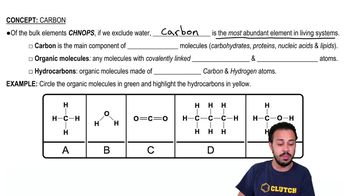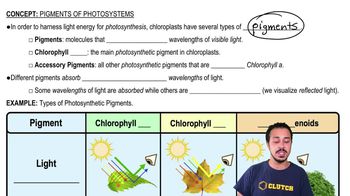Here are the essential concepts you must grasp in order to answer the question correctly.
Carbon Cycle
The carbon cycle is a biogeochemical cycle that describes the movement of carbon among the atmosphere, oceans, soil, and living organisms. Microbes play a crucial role in this cycle by facilitating the conversion of carbon compounds, particularly through processes like decomposition and respiration, which help recycle carbon back into the ecosystem.
Recommended video:
Microbial Photosynthesis
Microbial photosynthesis is the process by which certain microorganisms, such as cyanobacteria, convert carbon dioxide (CO2) and sunlight into organic materials, primarily glucose, while releasing oxygen as a by-product. This process is fundamental to the carbon cycle, as it transforms inorganic carbon into organic forms that can be utilized by other organisms.
Recommended video:
Pigments of Photosynthesis
Decomposition
Decomposition is the biological process through which organic matter is broken down into simpler substances by microorganisms, fungi, and other decomposers. This process is essential for recycling nutrients in ecosystems, as it converts complex organic materials back into inorganic forms, making them available for uptake by plants and other organisms in the carbon cycle.
 Verified step by step guidance
Verified step by step guidance Verified video answer for a similar problem:
Verified video answer for a similar problem:
